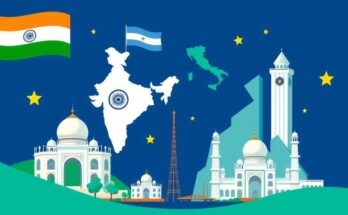“Capturing Water” by Rehad Desai examines South Africa’s water crisis exacerbated by climate change and governmental mismanagement. The documentary highlights the urgent need for equitable water distribution and grassroots activism while framing the issue within a global context of escalating water scarcity. It aims to inspire collective action against the growing inequities surrounding water access.
In early 2018, the Western Cape region of South Africa faced a severe drought that put reservoirs at critically low levels, leading residents to prepare for a dire situation known as “Day Zero,” when the municipal water supply would run dry. Although this catastrophe was narrowly avoided, filmmaker Rehad Desai warns in his documentary “Capturing Water” that the water crisis in Cape Town reflects a greater, looming threat as climate change exacerbates water shortages across the continent.
Desai conveys that by 2030, approximately 250 million people in Africa, mainly in urban areas, will experience water stress due to rising temperatures and ongoing climate change. He highlights that the crisis experienced by Cape Town from 2015 to 2020 was fueled not only by climate conditions but also by years of governmental neglect and mismanagement.
A grave consequence of this neglect is evident in the pollution of the environment; poorly treated sewage from Cape Town is pumped into the ocean, consuming 55 million liters of freshwater daily just for that operation. Furthermore, the situation across South Africa is concerning, with 3.5 million households lacking access to clean water and substantial losses attributed to leaking infrastructure. Desai stresses that municipalities lack the financial resources and expertise to address such issues effectively.
The inequitable distribution of water is illustrated by the stark contrast within Cape Town, where a mere 13% of the population consumes over half of the available water resources. The increasing industrial and residential demands coupled with a post-pandemic tourism boom accentuate the competition for clean water among local communities, particularly affecting poorer residents.
As water rationing becomes common, the disparities among socio-economic classes are exposed. Desai articulates pressing questions regarding the equitable distribution of water and efforts to prevent urban elites from hoarding resources while others are left without access. Though “Capturing Water” does not provide definitive answers, it highlights community-based solutions to the ongoing crisis, showcasing grassroots activism against water restrictions and pollution.
The documentary also reflects on broader global perspectives, illustrating how industries arising from climate change threaten water security worldwide. Examples include foreign ownership of farmland in California that jeopardizes local aquifers and financial speculators betting on rising water prices, ultimately commodifying this essential resource instead of ensuring it as a basic human right.
Rehad Desai, acclaimed for his previous documentaries, aims for a widespread release of “Capturing Water” across South Africa and beyond, intending to inspire urgent action against the ongoing water crisis. He emphasizes that emotionally moving audiences is crucial for fostering a community of activism and effective change.
In conclusion, Rehad Desai’s “Capturing Water” serves as a poignant reminder of both the urgency of South Africa’s water crisis and the larger implications of climate change on water security globally. The film emphasizes the need for equitable access to water and the power of grassroots activism as a means to combat the challenges posed by neglectful governance and climate conditions. Desai’s call to action seeks to empower communities to engage in solutions that advocate for water as a fundamental human right.
Original Source: variety.com




